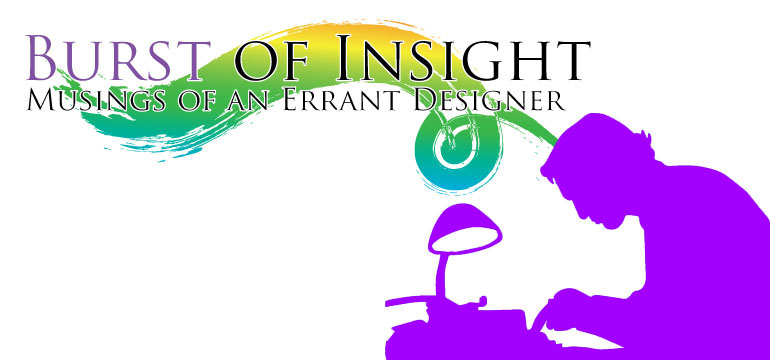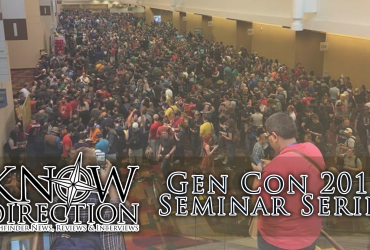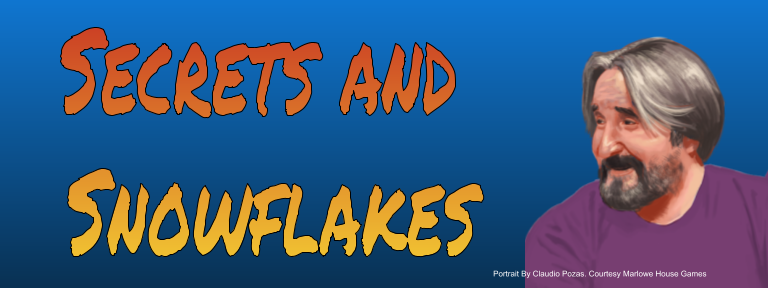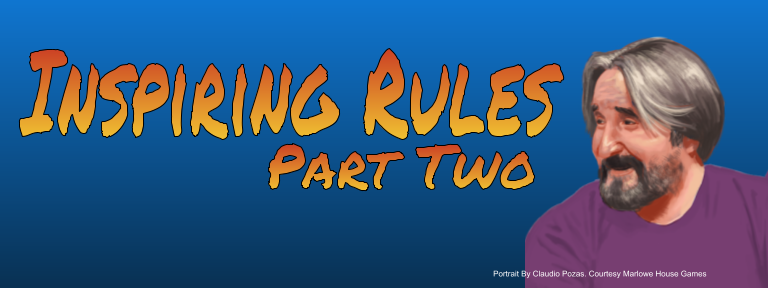Welcome to the latest installment of Burst of Insight. When I started this blog I had planned to alternate between talking about designing content for your table and interviewing industry experts on game topics. Over the course of this blog I’ve had exactly one interview. This week we are rectifying that, in a big and exciting way. Today, I’m joined by an ensemble of freelance designers, and competitive and celebrity GMs. Together, we’ll discuss how to run a great game.
My guests today are Savannah Broadway, Troy Lavallee, Nicolas Logue, and Alan Venable. Why don’t you each take a moment to tell our readers a little bit about yourselves what you’re currently working on (if you can) and how you got into gaming.
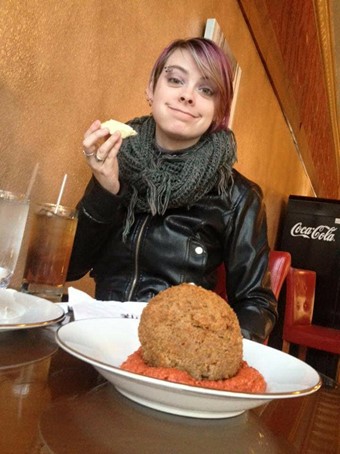
Savannah: Hey all, Savannah Broadway here. I’m a former Paizo intern turned freelance writer and editor. I’m currently working on the Book of Exalted Darkness from Mike Myler games, and my own passion piece, Spiders and Souffles, about a group of drow running a restaurant. My first taste of gaming was a book of AD&D art that my dad used for sketch references. 5-year-old me was instantly hooked on the idea, but I didn’t get a chance to play until late high school, when I cut my teeth on GURPS (the Satanic Panic still manages to linger in the Midwest).
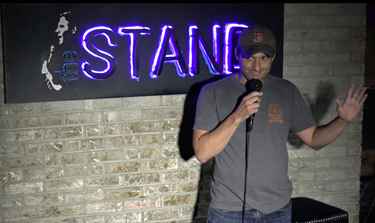
Troy: Well hello. I’m Troy Lavallee, the GM and producer of The Glass Cannon Podcast. I’m also an actor and comedian based out of New York City. The GCP is an actual play podcast of Paizo’s Giantslayer Adventure Path that we launched in June of 2015. Two years later, we signed a partnership agreement with Paizo to become their first officially licensed Pathfinder podcast. At Gen Con 50, we announced that we will soon be launching a second actual play podcast of the first Starfinder AP Dead Suns. I started playing in the early 90s, mostly 2nd edition, but I took a solid 20-year break before getting back into tabletop RPGs in my early 30s. Now, an embarrassing amount of my life is spent recording myself and my friends playing Pathfinder for a growing, highly critical worldwide audience and, once in a great while, for fun as well.
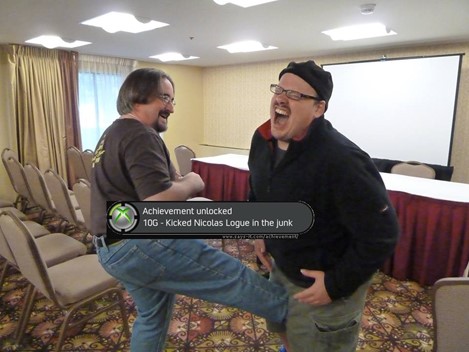
Here’s a picture of me kicking Nick in the junk. We all know he had it coming and you’re welcome.
Nicolas: Aloha Everyone! Nick Logue reporting in! I started gaming in with friends in middle school waaay back in the late 80s, mostly playing D&D, the old Marvel Superheroes game, eventually Shadowrun, Rifts, Call of Cthulhu and lots more games. I started freelancing for ye old Dungeon magazine back in 2002, and since then I’ve had over 100 adventures, campaign supplements and articles published by Paizo Publishing, Wizards of the Coast, Kobold Press and many other publishers. I created the Iron GM (formerly Iron DM) event at GenCon, and was the Organized Play Coordinator at Paizo Publishing briefly wherein I had a large hand in launching Pathfinder Society.
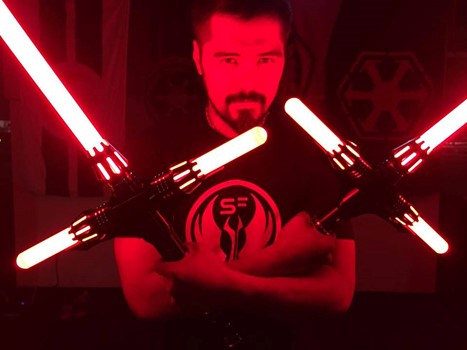
Alan: Hello, I am Alan Venable, I won Iron GM in 2016 and have a couple of games published in the Wield Companion. I am currently working on a multi-dimensional game that has been bouncing around in my head for a few years. I got into gaming because of a friend of mine in high school, who ran an Advanced Dungeons & Dragons game for me on the hour-long bus ride from home to school every day.
Now before we get started into what to do right. I’ve found that I learn more about GMing from my mistakes and the mistakes others make when running. For example, my long-term players still laugh about a session I ran about 20 years ago when they ran away from a summer breeze. I was running a Ravenloft campaign (from the first box set not the classic module) and evidently overdid the mood descriptions next thing I know they’ve fled the castle they’re staying in and running from a wind flowing through town. One player in a brave heroic moment decided to sacrifice himself and stand against the unseen pursuer. And I wasn’t prepared the wind blew around him and I missed an opportunity to deliver the heroic spotlight of personal sacrifice. In failing to deliver on the expectations of those players I turned a moment of horror into a 20-year punchline.
So what’s the biggest mistake you’ve made as a GM and what can we all learn from it?
Savannah: I worked on fiction writing long before I first GMed, so I’d say that my biggest mistake was treating the experience more like a monologue and less like a game. My descriptions of locations were generally at least a paragraph long (which I knew because I’d write them ahead of time) and I’d prioritize my story over the rules in a way that was detrimental to my players. Thankfully my group was patient with me, and I eventually got a grasp on one of the most fundamental truths of gaming: you’re all there to tell a story, not just the person running the game. Let the players describe their own actions (“How does it die?” is a super simple but very impactful question), ask them what outcome they think would be more interesting, and for goodness’ sake, value brevity in setting descriptors.
Alan: My biggest mistakes always come from the miscommunication or mismanagement of player expectations. After all, gaming is a social contract between the people around the table to come together and tell a certain story with an agreed upon theme. If your players think you are playing a tongue-in-cheek game of Toon, don’t run an espionage-laden SpyCraft session.
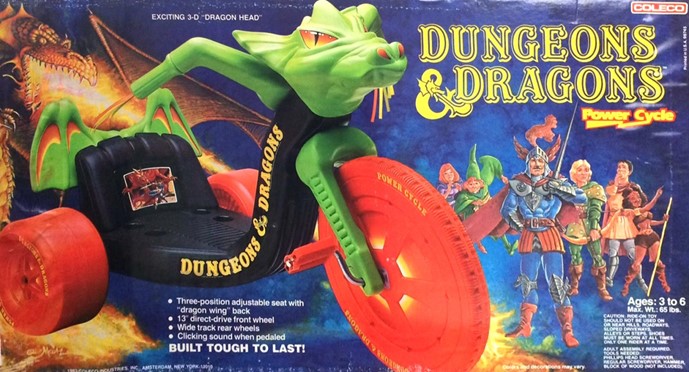
When you said we were going to play Dungeons and Dragons I didn’t think you wanted to ride big wheels.
Nick: I ran an adventure for Ninjas and Superspies one time, that was dubbed “Niagara Ninja” by my old gaming crew. It remains my biggest and most hilarious flop. The adventure was set mostly on a cable car traveling over the whirlpool near Niagara Falls, wherein, somehow, a triad assassin, a secret Iga ninja, a Canadian Mounted Police detective, and a CIA wetwork specialist were all trying to kill the same person. It was not my finest hour, but we do laugh about it often. The takeaway: Too many weird concepts crowbarred into one adventure – also, our set piece was a small cable car…it was cramped and did not supply much room for anything dramatic or action-oriented.
Troy: Deciding to do an actual play podcast. Kidding! That’s a great question. I definitely forget lots of minor elements all the time because I’m trying to focus on a million things at once. Whether it’s not remembering my creature has DR, that they have poisoned weapons, important feats – I don’t think a combat ever ends where I’m not kicking myself for blanking on a cool little detail that I got really excited about using when I prepped and then blanked on once we rolled initiative. In terms of major mistakes, maybe I’m just hopelessly optimistic, but I don’t think there is such a thing when you’re the GM. Never let them see you sweat. If you screw something up, find a way to make it work. They don’t need to know you’re an idiot. In summation, I’ve never made a huge mistake. Final answer.
With our mistakes out of the way, what makes a good game, great?
Savannah: When the players, the characters, and the story are in sync with each other. Great table rapport leads to great character interaction, which in turn leads to great stories. I started a pirate-esque game with the intention that it would be fairly serious. Instead, when the NPC who had press-ganged them gave his speech, everyone cracked up. One very fast mental re-calibration later, I had a fellow crew member look embarrassed about it all, which led to the PCs naming him Jeremiah Jorts and basically adopting him into their group. He’s group tailor/ cleric now. Make sure to keep an eye on the table and adjust the story, content, and tone based on what you see, and when your players want to insert something into the world, roll with it–within reason, of course.
Alan: A good game comes from a good moment, a great game comes from a series of good moments. When a PC pulls off an awesome moment, like solving the riddle before the sphinx eviscerates the party, or when the barbarian slays the dragon from within the dragon’s belly. In the end, great games come from the stories told about those moments years later.
Nick: Focus on the players and their characters. They are the stars of your movie. Make sure the action revolves completely around them. If you do this, and can check your own ego about your “story” at the door to the gaming room, you’re halfway to a truly memorable and glorious evening of gaming. NPCs exist only to serve up fun opportunities for drama, action and humor for your players – not to smack them down, or make them feel worthless. Remember that your players probably want to be Big Damn Heroes, so let them step up and knock it out of the park. Related: Get used to “reading” the table and the players. Try and figure out what they want out of the gaming session. You can always just ask them too, and then deliver it, but sometimes it’s best when you can intuit their hopes and desires for the session and deliver them.
Troy: The most important thing to me is the story, more specifically, engaging the players in the story as deeply as possible, so that they surprise even you when you hear them talk about it to each other. I love watching my players have those moments where I drop a big story element and they all gasp. To me, that’s like, ok, not only am I doing my job well by creating circumstances that hold real emotional weight with them, but also I feel like I’ve created an atmosphere where they feel comfortable allowing themselves to become so immersed in the story that their natural reactions are guttural. Those are always the best sessions.
What does your game prep look like?
Savannah: I try to make an outline of how I think the adventure will go, as well as its place in the overall plot, if it’s a homebrew. With APs I try to read the book that we’re on (and at least half of the next if we’re near the end) for optimal foreshadowing knowledge.
I don’t generally deal much with maps or minis, which gives me time to focus on props and general atmosphere. I run with Syrinscape a lot, so I make sure to put what soundpacks I want to go with what scene, as well as pertinent one-off sounds. Bags of coins, small bottles of strange liquid–i.e. soda water and fruit syrup–and definitely-not-cursed amulets that are cold to the touch (and definitely not from the freezer when the GM goes to refresh their drink) are all invaluable to bringing a little of that sense of wonder to even the most jaded players, so I make sure to scour estate sales, junk shops, and second-hand stores for anything that fits the bill.
Alan: I usually game at my house, so any and all my terrain pieces, miniatures, sound systems, and ambiance is basically prepped the night before. More elaborate sessions, like the musical Mage: The Ascension game I ran years ago, take a whole other session with the players to prep.
Away games tend to be a little tougher, as I can’t bring everything with me, but two-dimensional maps and pawns tend to do the trick. Also voice projection is key. In a crowded room at a convention, players need to hear you from across the table.
Nick: I prefer one-shots to campaigns these days. My prep is 100% focused on creating incredibly engaging and epic PCs for my players. That’s usually all I do. Their characters (and character sheets) are really the nuts and bolts of my adventure – all their relationships, foes, foils, strings-attached problems, are all included therein. Beyond that, I prep a really great playlist of music – if I have time, I make it a real soundtrack with songs picked out specifically for important scenes. I don’t use any miniatures, terrain, maps, etc. I strive to create a shared imaginative space, and would rather the players look at each other and me than down at a “board.” I don’t prep any stats for any NPCs or bad guys. Just a page or two of notes on their names and key features. I improv from there.
Troy: It used to be so much easier. Now that every single one of my sessions is picked apart by every Tom, Dick and Harry with a set of dice, I have way less room for error than I did before. To break it down methodically, I like to read everything once without thinking too much about it. If an idea pops into mind, I might jot it down, but for that first read, I just want to just soak up the raw info as much as possible and familiarize or refamiliarize myself with the bullet points. So on my second, third and fourth read-throughs of what I think will be happening in the next sesh, I’m taking progressively more and more detailed notes both in terms of mechanics (What does this feat do? What does this weapon enhancement do?) and story (How does this moment connect to the larger arc? How could I link this to a PCs backstory?) Then we sit down to play and I get so excited I forget everything I prepared.
How would each of you describe your GM style? What are some of the advantages and disadvantages of the way you run?
Savannah: If you were being polite, you might call my style “improv.” If you were less so, you’d call it “slapdash.” I enjoy generating ideas with my group on the fly (“What are some rumors going around town?” “Does your character have any rivals that might be in town?”) and rolling with the punches when the plot, inevitably, fails to survive contact with the players. The advantage is that the story stays flexible and always includes things that the characters want to see. The downfall, of course, is that the overarching plot can get lost in the face of the more episodic storylines. Similarly, I have enough experience with monster building that I can BS stats enough to get through a fight if the PCs wander off-track, but there can be inconsistencies later on if they encounter that same monster again. Also, this style makes me absolutely rubbish at running very regimented games, like Pathfinder Society.
Montages are one of my favorite things in the toolbox, and I try to incorporate them in at least once a session. For those of you unfamiliar with 13th Age, the idea of a montage is to take a scenario–say, crossing a mountain–and propose a problem to the players–“Sharp winds coming down the slope are threatening to gust you off the path.” Pick a player and go clockwise. That first player will solve the problem–“We get out rope and tie ourselves together, then my character goes first with her shield to serve as a wind-block”–and then propose another problem to the next player–“Unfortunately, the pack mule spooked and our food just fell into a ravine.” The idea of montages is that the players cannot fail in the actions they specify, and what combats there are don’t require rolling. They can and should be cinematic, but still within the abilities of the players–no interplanetary teleportation from first level wizards. Basically, give your players agency in a way that makes them feel cool and allows you to more or less stick to your storyline (they’re still getting across the mountain instead of hunting monsters in the woods, after all).
Alan: My GM style might be described as “cinematic.” I like to paint a picture with the paint brush of imagination, capture the sights, sounds, smells, and texture of each scene to create as much immersion as possible for my players. I use soundtracks, dim the lights, have scented candles or oils, and even occasionally create elaborate three dimensional maps of of the scenes I describe.
Core relationships and group dynamics are key in my sessions, with how and why this group of ragtag misfits have come together as murderous sell-swords or a party of big damn heroes. How did they all meet and decide to adventure together? Are they related to each other? Do they share a common enemy?
Action is as much roll-played as much as role-played, not only by how much damage is dealt, but also with detail in where a PC or NPC is hit and how they respond.
Nick: I’m an actor/playwright/director by day – my games are tightly wrought stories in which action and character are everything. I go for cinematic style, but blended with real powerful themes that make my players think and feel. I like to set the scene and describe a lot of elements and action early in the session, and then once the “world” has really come to life for the players, I take a backseat and let them drive from there. The advantage is that my games are wildly immersive experiences that are not quickly forgotten. The disadvantage is that some players find the focus on narrative over strategy a little frustrating. I do my best to please every player though – that’s key!
Troy: I like to play the bad guy, but I’m way more forgiving than most of my players would ever give me credit for. I’m a big fan of letting the dice control fate. I hate fudging numbers and keeping characters alive because of plot armor. Both as a GM and a player, I love high difficulty combats where everyone is truly challenged every single round. To me, there’s no fun in just crushing combat after combat. The Dark Souls series is a personal favorite of mine, and I try, as best I can, to implement that level of merciless masochistic difficulty into my encounters. I like to think that I balance that brutality by adding in as much humor as I can the rest of the time, whether it be through creating off-the-wall NPCs to interact with or judiciously breaking the fourth wall to keep things light. At the end of the day, though, if the table needs someone to hate, I’ll happily be that target any day I’m behind the screen.
I’d like to thank my guests for agreeing to come on the blog and share their collective wisdom. Come back in two weeks for the conclusion to our first Ask the Expert’s panel where they’ll address the different demands of event style games like Iron GM or an actual play podcast vs. a home game, talk about maintaining player excitement and more.

